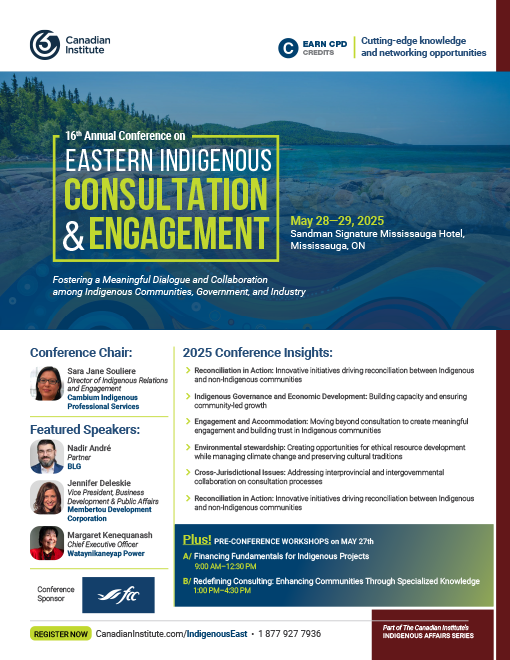Agenda

Flip through our conference brochure and discover what’s new this year.
Download Brochure
Pre-Conference Workshops
May 27, 2025
Day 1
May 28, 2025

Jennifer DeleskieVice President, Business Development & Public AffairsMembertou Development Corporation

James GoganPartnerMcInnes Cooper LLP

Troy MacDonaldPartnerDoane Grant Thornton

Monika Bear RobeSenior Manager, Indigenous ConsultingMNP
Achieving economic reconciliation requires partnerships rooted in trust that deliver benefits beyond financial rewards. These partnerships must foster collaboration, mutual respect, and long-term sustainability. Topics of discussion will include:
- Reviewing the partnership strategies that were essential in closing a billion-dollar deal to acquire a significant stake in North America’s largest integrated seafood company
- Partnering with resource-sector business including forestry, mining, energy, construction, and tourism

Margaret KenequanashChief Executive OfficerWataynikaneyap Power

Gary SmithExecutive Vice President, Operations & TechnologyFortis Inc.

Karen McCarthyVP, Communications and Government RelationsFortis Inc.
Many Indigenous communities are eager to own and lead projects that drive economic development, but face challenges including limited capacity, funding gaps, workforce shortages, and the need for advanced expertise. This session will explore practical strategies to overcome these barriers and build lasting opportunities for growth.
Topics of discussion will include:
- Examining the partnership strategies that involved 24 First Nations communities to build an 1,800 km transmission line
- Reviewing successes and lessons learned from the Wataynikaneyap Transmission Project
- Assessing the direct economic impact for the Indigenous communities involved in the project
- Discussing the unique engagement and consultation process between the 24 First Nation communities and their project partners
Networking Break and Refreshments

Lisa Marie MillikenConsultant, Training & Development (Indigenous), Reconciliation & Equity Learning UnitCity of Toronto

William (Bill) FlowersPrincipal PartnerBurnaCove Consulting

Michele BaptisteSenior Manager, Indigenous Procurement RelationsScotiabank

Melanie BookDirector-External Indigenous RelationsFCC
The federal government mandates that at least 5% of contract values go to Indigenous businesses to boost economic opportunities but is 5% enough for true reconciliation? While businesses must be 51% Indigenous-owned, leadership and decision-making roles are not required to be Indigenous making it harder to substantiate procurement claims. Many Canadian corporate leaders have implemented their own Indigenous procurement practices with higher participation levels for Indigenous businesses to further advance reconciliation.
Topics of discussion will include:
- Strategizing pathways to increase procurement contracts awarded to wholly owned Indigenous businesses
- Facilitating meaningful collaboration with industry partners seeking to expand their Indigenous procurement
- Reviewing the federal procurement requirements and exploring necessary reforms for equitable access
- Assessing opportunities for corporate Indigenous procurement for non-federal contracts

Lindley KennyDirector, Indigenous RelationsMetroLinx

Marian PaulFounderKamamak Consulting

Cynthia StoneTraining CoordinatorCity of Toronto
The United Nations Declaration on the Rights of Indigenous Peoples (UNDRIP) Act and the duty to consult have helped involve Indigenous communities on issues pertaining to their Treaty rights – but at what cost? As nations continue to be inundated with consultation requests while building capacity, ‘consultation fatigue’ is becoming more prevalent. Meaningful engagement, involving multiple partners, offers a path to more effective consultations.
Topics of discussion will include:
- Discussing strategies for overcoming consultation fatigue
- Assessing how technology may be able maximize efficiency and improve response times
- Defining the role of government, proponents, and communities to prevent delays
- Overcoming information overload and defining where to prioritize
Networking Lunch

Stephen JacksonCEOAnishnabeg Outreach Employment and Training Inc. and AONest Inc.
Networking Break and Refreshments
Indigenous youth are key to capacity building and advancing reconciliation in their communities. This session brings together emerging Indigenous leaders to share their perspectives on critical issues and strategies for creating a brighter future.
Topics of discussion will include:
- Sharing the apprenticeship and training programs that supported their success
- Creating advanced economic opportunities for Indigenous youth returning to their communities
- Addressing critical challenges like addiction, mental health, and suicide
- Strengthening youth leadership to drive community growth and innovation

Stuart RandellDirector, Major Projects & External Financial AdvisoryMNP

Amadeus DomaradzkiDirector of Execution and AdvisoryCanada Development Investment Corporation
Indigenous communities are increasingly driving economic development through ownership and partnerships with project proponents. However, access to capital and financial expertise remains a barrier to entry for Indigenous communities. This session will explore solutions and tools to help overcome these challenges.
Topics of discussion will include:
- Outlining the process for submitting a successful project application
- Examining funding and financing options available that require minimal assets
- Defining the role of lawyers and consultants in the ownership process
- Determining how the community can work with proponents to minimize environmental impacts
Day 2
May 29, 2025
Debuting in 2022, Ontario’s Critical Minerals Strategy aims to meet growing global demand amid supply shortages and geopolitical conflict. While mining supports over 11% of direct Indigenous jobs in Canada, critics argue the strategy lacks sufficient consultation and has yet to deliver the promised economic benefits for Indigenous communities.
Topics of discussion will include:
- Examining how the strategy may help to remove regulatory barriers from mining
- Debating how the strategy may help to ease the burden from U.S. tariffs by helping diversify Ontario’s economy
- Defining how Resource Revenue Sharing (RRS) agreements between the Ontario government and Indigenous communities are helping create economic development
- Outlining how the Aboriginal Participation Fund (APF) can assist with capacity building for consultation

Stephen JacksonCEOAnishnabeg Outreach Employment and Training Inc. and AONest Inc.
Substance abuse and mental health crises continue to disproportionately affect Indigenous peoples – both on and off reserve, crating profound social and economic challenges.
Topics of discussion will include the urgent need for culturally informed solutions and community-driven initiatives to address these interconnected issues to help pave the way for healing and resilience.
Networking Break and Refreshments

John DunlopManager Indigenous Relations, Heritage and MuseumsCity of Mississauga

Katelyn LaFormeDirector of Indigenous RelationsCity of Hamilton

Rozella JohnstonSenior Advisor, Indigenous Reconciliation Corporate Projects and Liaison DivisionCity of Brampton

Selina YoungDirector, Indigenous Affairs OfficeCity of Toronto
Ontario’s updated Planning Act now requires municipalities to engage with treaty and Indigenous communities on all land planning decisions. This shift has posed challenges as municipalities work to understand duty-to-consult legislation and meet legal obligations.
Topics of discussion will include:
- Defining the consultation requirements for municipalities and the province of Ontario
- Comparing municipal Indigenous engagement policies across Canada to establish a benchmark for consultation
- Examining the role of Treaty rights vs. the rights as Indigenous person in an urban municipality

Nadir AndréPartnerJFK Law
In November 2024, the Supreme Court of Canada set a landmark precedent by confirming that contracts between the Crown and Indigenous communities must uphold the honour of the Crown. The case highlighted Quebec’s breach of good faith in failing to negotiate funding with honour and integrity for an agreement to establish the Sécurité publique de Mashteuiatsh, an Indigenous police force. This decision will shape how future Crown contracts with Indigenous peoples are managed.
Topics of discussion will include:
- Understanding the Supreme Court’s definition of honour and integrity in Crown-Indigenous contract negotiations
- Exploring remedies for reconciliatory justice to resolve disputes effectively
- Drafting clear, enforceable agreements that withstand litigation challenges for dishonourable conduct
- Assessing the significant consequences for agreements in other service areas, including child welfare
Networking Luncheon
Join Indigenous Chiefs to hear about the most pressing priorities affecting Indigenous communities, and how to best navigate consultation obligations through 2025. Topics for discussion will include:
- Balancing community health, safety, and addictions with pressing consultation priorities
- Building capacity and creating employment opportunities for Indigenous youth
- Predicting upcoming consultation priorities from 2025 and opportunities for collaboration

Tom HilditchFounder & PresidentColucent Environmental
Land reclamation and remediation are providing Indigenous communities with new economic opportunities that were not previously available. Communities are capitalizing on their historical knowledge and environmental stewardship expertise to reclaim their nation’s lands and provide prosperity and greater health to their communities at large.
Topics of discussion will include:
- Examining ancestral reclamation strategies and how to conduct reclamation to its original purpose
- Showcasing successful reclamation projects with new water and power use
- Harnessing Indigenous and local knowledge for maximum efficiency
- Balancing environmental protection while achieving economic goals
Networking Break and Refreshments
These interactive roundtables offer attendees the chance to dive deep into key topics, gain valuable insights, and exchange ideas with peers. With expert-led discussions, participants will uncover actionable strategies and best practices critical to advancing consultation and engagement.
ROUNDTABLE #1: ENGAGEMENT AND CONSULTATION
This roundtable will explore the importance of building strong and collaborative relationships with Indigenous communities for meaningful engagement and consultation to occur. Experts will share their insights on some of the key challenges with engagement and consultation and share why accommodation is becoming an essential part of the engagement and consultation process.
ROUNDTABLE #2: BALANCING ECONOMIC DEVELOPMENT WITH ENVIRONMENTAL STEWARDSHIP
Economic development is important for Indigenous communities but creating economic prosperity while working with proponents to minimize environmental impacts can be challenging as not all community members agree on how to address the cumulative effects from development. This roundtable will examine how to balance economic development and the environment and will look at new models of economic development including reclamation and remediation.

